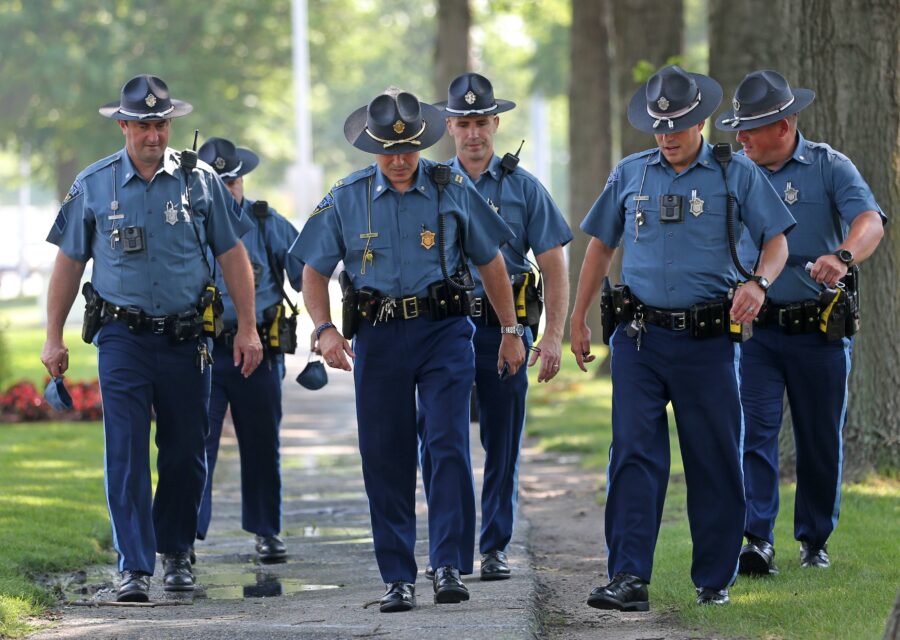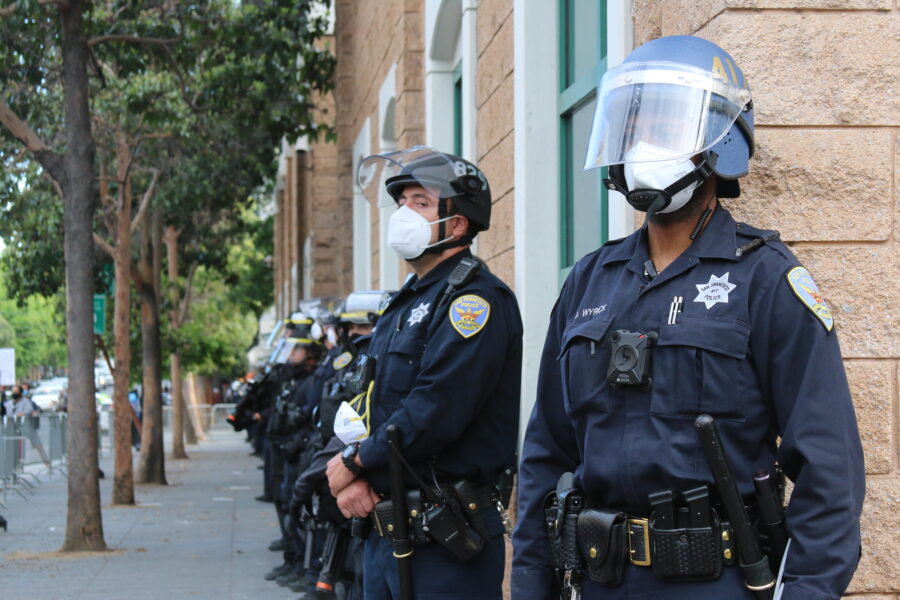Law enforcement plays a crucial role in maintaining public safety and order in communities across the United States. However, many people may not fully understand the distinctions between state and local law enforcement agencies. While both types of agencies are responsible for enforcing laws, there are important differences in their roles, responsibilities, and jurisdiction.
In this article, we will explore the nuances between state and local law enforcement, including their respective duties, training requirements, and legal authority. By gaining a deeper understanding of these distinctions, individuals can better navigate their interactions with law enforcement and work towards a safer and more just society.
Definition of State Police and Local Police

State police are state government organizations that are responsible for statewide, multi-jurisdictional law enforcement. This includes traffic enforcement, investigations into criminal activities and other proactive efforts to protect public safety.
Often considered the primary difference between the two branches is that while the state legislature makes laws that are enforced by both entities, only state governments have the power to establish formal laws throughout all parts of their respective states. Local governments can pass ordinances specific to their towns or cities; this is why city streets may appear cleaner than those in rural areas due to additional littering restrictions put in place by authorities there.
Meanwhile, all drivers across a given state must adhere to the same speed limits imposed by the same organization — namely the state legislature via its relevant body such as a highway patrol unit — regardless of where they are driving along that particular stretch of road from one county into another or from one municipality into its neighbors’ areas.
Differences in Responsibilities
The roles for them differ in terms of jurisdiction, training and other aspects. State police are responsible for patrolling highways, conducting criminal investigations and enforcing state laws whereas local police are responsible for patrolling in the areas that they serve, responding to calls for service and enforcing local ordinances.
State Police Responsibilities

They are responsible for enforcing state laws and regulations, providing assistance to local law enforcement agencies and investigating criminal activity in unincorporated areas outside of local jurisdictions. These officers have the authority to exercise their powers anywhere in the state, regardless of county or city limits.
State police departments are typically tasked with interstate policing activities, highway patrol, motor carrier safety and drug enforcement investigations. This distinguishes them from local police departments which address a more confined jurisdiction. State and local law enforcement agencies typically work together for investigations that span both jurisdiction lines or when one agency needs additional resources.
Their officers have general investigative duties as well as specialized roles within the department including hazardous incident response; accident investigation; arson investigation; polygraph examiners; aviation/helicopter patrols; forensic identification experts; undercover agents; SWAT teams; gang and terrorism task forces; fugitive apprehension teams; firearms instructors; K-9 units; marine patrol officers and more. State police departments often support regional joint task forces with other law enforcement agencies along interstate boundaries.
While some state laws may be the same in multiple regions throughout a particular state, each municipality may also have its own ordinances or statutes unique to it that require law enforcement attention frequently requiring collaboration between local and state forces.
Local Police Responsibilities

They are employed by the municipalities and are responsible for the safety and security of their respective communities. Their primary duty is to enforce laws that pertain to a specific geographical area, such as county or city boundaries. In some cases, however, they may be involved with enforcing state laws as well.
Local police officers typically have jurisdiction over traffic enforcement within their respective city or county limits. They conduct criminal investigations and patrol neighborhoods to deter crime. They also serve arrest warrants, have the power to make arrests and take action when criminal activity is suspected or observed in their jurisdiction. Additional duties of a local cop may include handling disputes, responding to domestic violence calls and serving search warrants related to criminal investigations. Collaboration between local law enforcement agencies can sometimes be necessary for larger-scale investigations or operations involving multiple jurisdictions.
Differences in Training
As the roles for them differ, so do the training requirements for each. State police officers typically have more comprehensive and rigorous training than local police officers, in addition to specialized training on state laws.
This section will go into more detail about the training differences between state police and local police.
State Police Training

The training received by these officers is much more intense than that of local police officers. In some states, police academy programs for state troopers can last up to six or seven months, with field training taking even longer. These officers typically receive extensive physical and psychological testing, as well as extensive firearms training.
They learn how to drive defensively, investigate complex crimes and master the use of specialized law enforcement equipment such as radar equipment and breath-testing devices. Additionally, state troopers often take part in specialized courses related to homeland security and counterterrorism operations.
Due to the rigors of their training programs, State Police candidates generally must have higher levels of education and physical fitness than their local police counterparts. Potential state troopers must also pass a comprehensive background check before they can be accepted into a State Police Academy program.
Upon completion of the required training courses and fieldwork, prospective officers are then sworn in as an agent of the state government. This marks the end of their academy period and begins their life as full-fledged members of their respective state’s law enforcement team.
Local Police Training

Their training consists of a variety of different types of certification programs, depending on the jurisdiction and area. Generally, their recruits must have a high school diploma and must attend their local police academy for officers. The academy is typically an eight-week training program designed to teach new officers about the many aspects of policing. During this time, recruits are taught about criminal law, emergency management, public safety procedures, and other related topics.
In addition to classroom training, recruits must also participate in hands-on exercises to further develop their skills as Law Enforcement Officers (LEO). An additional form of training that some local departments require is field training with experienced officers in the department. This type of training is essential for new officers as it gives them hands-on experience in various types of real policing scenarios they may encounter while patrolling an assigned area or responding to emergency calls.
Also, prior to beginning field training, most officers are required to pass physical ability tests such as running sprints or completing obstacle courses with their equipment. These tests evaluate their strength and physical endurance amongst other things. Finally, every Department requires that all LEOs complete firearms proficiency tests as well in order to safely handle firearms on duty.
Differences in Jurisdiction

The difference between them also lies in the jurisdiction each operates under. State police have the authority to investigate and enforce laws throughout the entire state, while local police can only do so within their city or county.
State Police Jurisdiction
They are state-level law enforcement agencies that typically operate within a single state’s geographic borders. State police officers have the authority to enforce certain laws across the entire state and have jurisdiction over any county or municipality, unlike local police departments which enforce laws only in their city or county.
The primary responsibilities of most state police officers are related to motor vehicle traffic and highway patrol, responding to calls for service and assisting other law enforcement agencies in appropriate investigations or cases, such as search and rescue or homicide investigations. Additionally, many states employ special units whose primary responsibility is related to drug trafficking, organized crime, terrorism or vice investigations.
State-level agencies may also employ forensic analysts who serve as expert witnesses in legal proceedings.
Local Police Jurisdiction
Local police have the authority to enforce laws, investigate crimes and make arrests within their area of jurisdiction. The jurisdiction of a local police department usually covers one city or borough but may expand to cover a few more. Local police departments are responsible for protecting, patrolling and responding to citizen inquiries in public places like roads, parks and other public areas.
To become an officer with a local police department, you must be a citizen and pass physical tests as well as background checks. In addition, most cities require certifications from agencies such as the state police academy, peace officer standards and training (POST) or similar organizations for officers who are transferring from other towns. The laws governing the duties of local police vary by state but generally include dealing with traffic violations, making felony arrests, investigating criminal activity and responding to calls for help or disturbances in their community.
Local departments may also provide support to neighboring communities by offering resources like providing backup during higher-priority incidents or supplying on-site support if needed. Local law enforcement personnel attend rigorous training courses that focus on maintaining order in their communities while respecting citizens’ rights; they also have specialized skills that help them identify suspicious activity in high-crime areas or handle potentially dangerous situations such as hostage negotiations or active shooter crisis.
Differences in Pay

When it comes to the differences in pay between state police and local police, there are quite a few things to consider. Both types of officers will often receive similar wages, but there can be differences in the way that their pay is determined.
State Police Pay
The pay for state police officers varies depending on factors such as the state in which they serve, their rank and their experience. Generally, pay begins at a lower rate for entry-level or rookie officers and increases as these officers gain experience.
In addition to an officer’s base salary, certain states may offer bonuses or incentives for certain types of policing, such as working overtime or in dangerous conditions. In some states, they can also qualify for educational benefits from the state government if they choose to pursue higher levels of education relating to law enforcement.
Because each state has different policies and requirements on wages and benefits for police officers (including local police), it is important that individual troopers research the laws for their particular jurisdiction before applying for a position with the state police department. Furthermore, within most states, there are often differences in pay between different jurisdictions, so it is important to properly assess all options thoroughly before committing to a department or division of the State Police force.
Local Police Pay
The pay scales of local police vary depending on region and jurisdiction, but they are generally higher than state troopers in most areas. Local officers typically make more than their state counterparts because they receive higher wages and benefits from local agencies.
In general, a starting salary for a local police officer is usually around $50,000 or more per year and can continue to increase over time depending on the department’s budget and years of service. In addition to salary, many departments offer extra compensation for education or certifications that could increase an officer’s pay significantly. Most departments also offer overtime pay for extra hours worked.
Additionally, in order to attract qualified applicants and retain current staff, many local police departments provide paid time off and health care benefits such as health insurance coverage or dental plans, as well as life insurance policies to support officers’ families while they are away protecting the community.
FAQs

Q: How do these enforcement agencies work together?
A: State and local law enforcement agencies often work together to enforce laws and maintain public safety. For example, state law enforcement may assist local law enforcement in investigating a major crime or responding to a natural disaster.
Q: Are there different qualifications for working in state vs local law enforcement?
A: Qualifications for working in state and local law enforcement vary, but generally, state agencies may have more stringent requirements, such as a college degree or specific training, while local agencies may require less formal education and training.
Q: Can state law enforcement enforce local laws?
A: They can enforce them if the local agency requests their assistance or if the state law enforcement agency has jurisdiction over the area in question.
Q: Can local law enforcement enforce state laws?
A: They are responsible for enforcing state laws within their jurisdiction, in addition to local ordinances.
Q: Can state and local police enforce federal law?
A: Yes, state and local police officers can enforce the federal law under certain circumstances. For example, they can be deputized as federal agents to assist in specific investigations or operations.
Q: Can they make arrests for federal crimes?
A: Their officers can make arrests for federal crimes that they witness or have probable cause to believe have been committed. However, state and local police officers generally do not have the authority to enforce all federal laws, as some are exclusively within the jurisdiction of federal law enforcement agencies.
Conclusion
In conclusion, understanding the differences between state and local law enforcement is essential to grasp how law enforcement works in the United States. Both state and local law enforcement agencies play a crucial role in maintaining law and order in their respective jurisdictions. While their functions and responsibilities may differ, they ultimately work towards the same goal of ensuring public safety and enforcing the law.
It’s important to recognize that state and local law enforcement agencies are not in competition with each other, but rather complement each other in addressing crime and maintaining order. By working together, they can achieve a more effective and efficient system of law enforcement that benefits the community as a whole.

